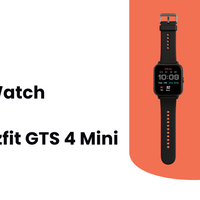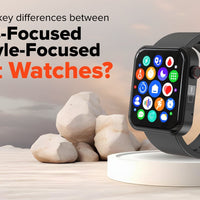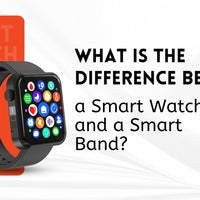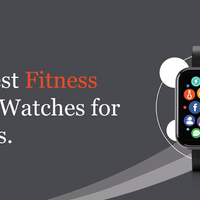Key Takeaways
-
Smartwatches are transforming healthcare by providing real-time health data and empowering users to take control of their health.
-
Early detection of issues like irregular heart rhythms and abnormal oxygen levels can lead to faster treatment and better outcomes.
-
Chronic disease management is easier with medication reminders and health tracking.
-
Personalized healthcare is possible through real-time data shared with healthcare providers.
-
Patient empowerment leads to better adherence to treatment plans and healthier lifestyle choices.
-
Life Watch stands out with its comprehensive health-tracking features, user-friendly design, and affordability, making proactive health management accessible to more people.
Gone are the days when people waited for their health to signal a problem before seeking medical help. Early detection is now encouraged more than ever, and one of the most effective ways to achieve this is by wearing a smartwatch that tracks your health every minute. From monitoring heart rate to detecting irregularities in blood pressure, smartwatches like Life Watch are helping people stay on top of their health in real time, empowering them to take charge of their well-being before problems escalate.

The Role of Smartwatches in Modern Healthcare
What Are Smartwatches?
Smartwatches are wearable devices designed to track health and fitness metrics while also offering smart features like notifications, calls, and messaging. Most smartwatches, including Life Watch, monitor vital signs such as heart rate, sleep patterns, blood oxygen levels, and activity levels. Popular brands like Apple, Fitbit, and Garmin have made smartwatches mainstream, but Life Watch stands out for its comprehensive health-tracking capabilities and user-friendly design.
The Shift to Proactive Health Management
Smartwatches have shifted the focus from reactive to proactive healthcare. Instead of waiting for symptoms to appear, users can now monitor their health in real-time and take action before issues arise. Life Watch allows users to keep track of key health indicators and alerts them to any abnormalities, encouraging better health management and helping to prevent serious conditions.
Key Ways Smartwatches Are Changing Healthcare
Early Detection of Health Issues
One of the biggest benefits of smartwatches is their ability to detect health issues early. Continuous monitoring of heart rate, blood oxygen levels, and sleep patterns can reveal warning signs like:
-
Irregular heart rhythms (atrial fibrillation)
-
High or low blood pressure
-
Abnormal oxygen levels
Life Watch, for example, can notify users of these issues, allowing them to seek medical attention before the problem becomes serious. Early detection can prevent complications and improve long-term health outcomes.
Chronic Disease Management
For people with chronic conditions like diabetes, hypertension, and heart disease, smartwatches offer a lifeline. Life Watch helps users track key health metrics and receive timely reminders for medication, exercise, and other health habits. With real-time data available, users can adjust their daily routines and make informed decisions about their health.
Personalized Healthcare
The data collected by smartwatches is not only valuable to users, it’s also useful for healthcare providers. Life Watch provides insights into a user’s daily health patterns, which can be shared with doctors to create tailored treatment plans. This means better diagnosis, more effective treatments, and improved health outcomes.
Patient Engagement and Empowerment
Access to personal health data encourages users to take control of their health. Seeing real-time feedback on heart rate, sleep, and activity levels helps users make smarter lifestyle choices. Life Watch empowers users by providing clear, actionable insights, leading to better adherence to treatment plans and improved overall health.

Real-Life Applications of Smartwatches in Healthcare
For Individuals
Smartwatches like Life Watch enable individuals to stay on top of their health. From detecting early signs of heart problems to improving sleep quality, the ability to monitor health metrics in real-time gives users greater control over their well-being.
For Healthcare Providers
Doctors and healthcare professionals can access real-time data from smartwatches, leading to better diagnoses and more personalized treatments. Life Watch provides a more complete picture of a patient’s health beyond what can be observed in a single office visit.
For Elderly Care
Fall detection and remote monitoring are game-changers for elderly individuals. A smartwatch’s fall detection feature can automatically alert emergency contacts if a fall occurs, providing peace of mind for both the user and their family. Remote monitoring allows healthcare providers to track an elderly patient’s health without requiring frequent in-person visits.
Challenges and Considerations
Accuracy and Reliability
While smartwatches have improved significantly in accuracy, they’re not perfect. Factors like skin tone, tattoos, and movement can affect readings. Life Watch strives to provide accurate data, but it’s essential to consult with a healthcare provider for professional interpretation.
Data Privacy and Security
Personal health data is sensitive information. Smartwatches collect a large amount of data, raising concerns about privacy and security. Life Watch follows strict security protocols to protect user data and ensure that personal health information remains private.
Accessibility and Cost
Not everyone can afford high-end smartwatches. Life Watch addresses this by offering competitive pricing without compromising on features. Ensuring that smartwatches are affordable and accessible to diverse populations is crucial to maximizing their impact on healthcare.
The Future of Smartwatches in Healthcare
Emerging Technologies
Smartwatch technology is evolving rapidly. Future advancements may include more accurate blood pressure monitoring, stress tracking, and AI-driven insights. Life Watch is continuously improving its features to stay ahead of these developments.
Integration with Telemedicine
Smartwatches are expected to play a bigger role in telemedicine. Real-time health data from Life Watch can enhance virtual consultations, providing doctors with a more complete view of a patient’s health.
Expanding Accessibility
As smartwatch technology becomes more affordable, more people will benefit from real-time health monitoring. Life Watch is committed to making its health-tracking technology accessible to a wider audience.

Life Watch: A Game-Changer in Healthcare
Unique Features of Life Watch
Life Watch stands out with its advanced health-tracking features, including:
-
Heart rate monitoring
-
Blood oxygen level tracking
-
Sleep analysis
-
Track calories burned
These features make Life Watch a reliable tool for proactive health management.
User-Friendly Design
Life Watch is designed for ease of use. Its intuitive interface and seamless smartphone integration make it easy for users of all ages to navigate and benefit from its features.
Accessibility and Affordability
Unlike some high-end smartwatches, Life Watch offers competitive pricing without sacrificing quality. This ensures that more people can benefit from the health advantages of wearable technology.
Conclusion
Smartwatches have evolved from simple fitness gadgets to essential health tools, giving people the power to monitor and manage their health with ease. With features like heart rate tracking, sleep monitoring, and real-time alerts, users can make informed decisions and detect potential issues early on. Now, investing in a smartwatch is about taking control of your health.
If you are ready to take the first step toward smarter health management, then Life Watch is here to help you every step of the way.















